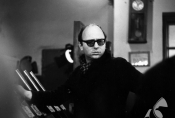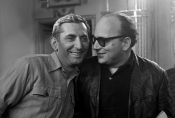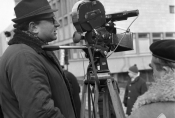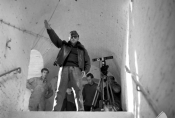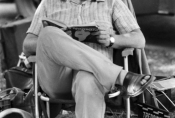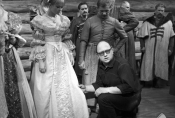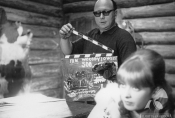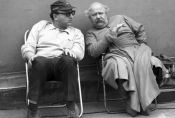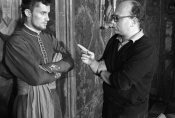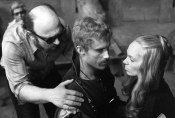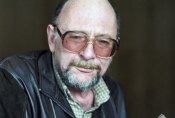Jerzy Hoffman
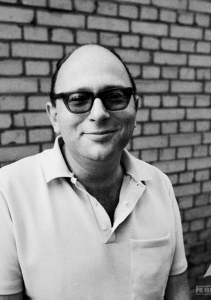
Film, theatre and television director, screenwriter and producer. He was born on March 15, 1932 in Kraków. In 1940, he was deported to Siberia; he returned to Poland after the war. A graduate of the Directing Department of the Moscow VGIK (1955). As a director, he made his debut in 1954 – together with Edward Skórzewski, with whom he collaborated for many years as a very successful creative duo – with a staged documentary about vandals destroying lawns Czy jesteś wśród nich?!/Are You Among Them? Their joint projects, including Uwaga chuligani!/Beware Vandals! (1955) or Dzieci oskarżają/Children Accuse (1956), are the leading achievements of the so-called black series of Polish documentary cinema. Their Pamiątka z Kalwarii/ Memento From Calvary (1958) won the Grand Prix in Oberhausen (1966) and the Special Award in Florence (1967) and Dwa oblicza Boga/The Two Faces of God (1960) – the Silver Wawel Dragon at the first National Short Film Festival in Kraków (1961).
The duo’s feature film debut was a two-part comedy Gangsterzy i filantropi/Gangsters and Philanthropists (1962). Later, they made: Prawo i pięść/The Law and The Fist (1964), a western-like dramatic story set shortly after the end of the war in the Western Territories of Poland, and Trzy kroki po ziemi/ Three Steps on Earth (1965), a contemporary drama inspired by a sociological survey and newspaper articles which was awarded the Silver Medal in Moscow. Hoffman’s first independent feature film was the third part of Sienkiewicz's Trilogy – Pan Wołodyjowski/Colonel Wołodyjowski (1969, Golden Duck). Other novels by Sienkiewicz, for reasons mainly political in nature, had to wait for adaptation: Potop/The Deluge (nominated for an Oscar, a Golden Lion in Gdańsk) hit the screen in 1974, and Ogniem i mieczem/With Fire and Sword – in 1999 (3 Eagles, a Golden Duck, awards in Moscow and Gdynia). Jerzy Hoffman, known previously for his documentary interests, unexpectedly turned out to be a master of the cinema of battle, making pieces with great gusto and visually stunning sets. The scale of some of his projects is also impressive: Do krwi ostatniej/To the Last Drop of Blood (1978 Special Award in Gdańsk), Stara baśń/An Ancient Tale (2003), based on the novel by Józef Ignacy Kraszewski, or 1920. Bitwa Warszawska/1920. Battle of Warsaw (2011), filmed in 3D. The director also likes inter-war bestsellers, such as: Trędowata/Leper (1976), an elegant adaptation of the trashy novel by Helena Mniszkówna, and Znachor/Quack (1981), a no less successful screen version of the best-selling book by Tadeusz Dołęga-Mostowicz. Hoffman’s films are some of the most popular titles in the history of Polish cinema.
Artistic director of the "Zodiac" Film Studio (1980-1997). In the years 1983-1987, he served as deputy president of the Polish Filmmakers Association, and in 1987-1989, he was a member of the Committee of Cinematography.
The artist was awarded the Medal for Merit to Culture – Gloria Artis (2005), the Eagle award for lifetime achievement (2006), and Platinum Lions at the 34th Polish Film Festival in Gdynia (2009).
Jerzy Armata
Selected filmography
-
1974
THE DELUGE
